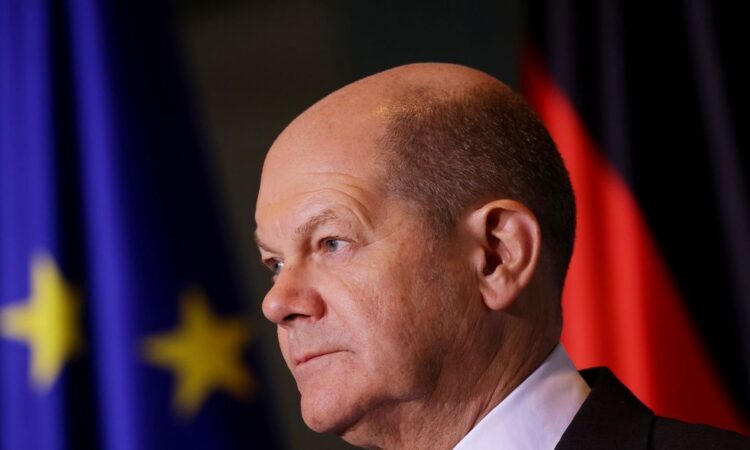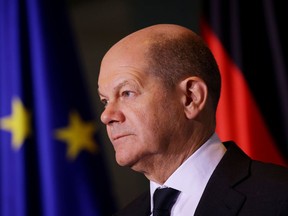
German Chancellor Olaf Scholz and his Social Democrats will call for the European Union to create new joint financing instruments to help member states compete against increased US subsidies for green technology.

Article content
(Bloomberg) — German Chancellor Olaf Scholz and his Social Democrats will call for the European Union to create new joint financing instruments to help member states compete against increased US subsidies for green technology.
Advertisement 2
Article content
Scholz’s Social Democrats want to see a reform of the EU’s existing state-aid rules and more funds to match the US green-aid push, according to a draft paper on European industrial strategy seen by Bloomberg.
Article content
A person with knowledge of his thinking said the chancellor supports the proposals set out by his party and wants EU leaders to endorse additional financing tools so that member states with tighter budgets won’t be left behind in the green-subsidy race.
The move comes amid growing skepticism in Brussels and other European capitals that President Joe Biden’s administration will make any meaningful changes to its $370 billion green-investment plan. The bloc says the law unfairly discriminates against European companies and threatens to lure green industries across the Atlantic.
Advertisement 3
Article content
“We need a European industrial investment initiative with a special focus on future technologies, the expansion of renewable energies and the promotion of industrial innovation,” the party says in the document, which was finalized Monday and is due to be published this week.
To this end, the EU should reallocate unused funds from the post-pandemic recovery fund and beef up its energy investment program in particular. In addition, the SPD wants member states to use the upcoming review of the EU budget to prioritize investment projects for the green transformation.
“Additional joint financing instruments should also be examined constructively,” the draft strategy paper says — without specifying whether that would also involve joint EU borrowing, a contentious issue for many Germans, who worry that they will be on the hook for the uncontrolled spending of other countries.
Advertisement 4
Article content
Scholz was finance minister under his predecessor, Angela Merkel, in 2020 when leaders sealed a historic agreement to issue joint debt to finance loans and grants for the recovery fund. The SPD hinted that this time jointly backed loans issued by the European Investment Bank could be an option for member states with tight national budgets.
“We want to strengthen the role of the European Investment Bank,” the strategy paper says. “The EIB must be comprehensively strengthened in terms of its organization and also be equipped with additional instruments.”
Discussions on the subject among EU leaders are at a very early stage and it will be difficult to forge a consensus given the resistance in some member states with a tradition of fiscal prudence, the person close to Scholz said. Any agreement will probably take several months but Scholz nevertheless believes that there must be European financing in addition to ramping up national subsidies, the person added.
Advertisement 5
Article content
According to the SPD strategy paper, the suggested steps should create a strong, common framework for European support that will demonstrate solidarity to those member states that do not have sufficient funding opportunities of their own.
The SPD wants the EU to expand its subsidy program for important European technology projects. Existing projects in the areas of battery-cell production and green hydrogen should be deepened and given more funding while new ones in other areas should be ramped up much faster and with less bureaucracy, the paper says.
EU leaders will meet in Brussels next month to discuss its response to the US law, with some proposing a so-called Buy European Act to help bolster domestic companies. The bloc has said it may file a complaint against the US at the World Trade Organization, a prospect that could undermine transatlantic unity in the midst of Russia’s war in Ukraine.
Nonetheless, Scholz and the SPD want the EU to deepen its trade relations with the US as its most important trading partner and use talks at the EU-US trade and technology council to lower or even abolish tariffs. “A first step could be the resumption of negotiations for a European-American industrial tariff agreement,” the paper says.
In addition, the EU should sound out whether the US is willing to start new negotiations for a broader agreement for a common free-trade area.







